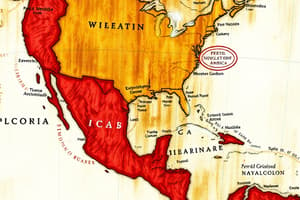Podcast
Questions and Answers
What was the primary goal of Ferdinand and Isabella's marriage?
What was the primary goal of Ferdinand and Isabella's marriage?
- To consolidate power and unify Spain (correct)
- To establish trade routes with Africa
- To explore the New World
- To spread Catholicism throughout Europe
What was the outcome of the War of the Castilian Succession?
What was the outcome of the War of the Castilian Succession?
- The establishment of a new monarchy
- The strengthening of the alliance between Castile and Aragon (correct)
- The defeat of Ferdinand and Isabella
- The independence of Granada
What was the consequence of the Alhambra Decree issued by Ferdinand and Isabella?
What was the consequence of the Alhambra Decree issued by Ferdinand and Isabella?
- The conversion of all non-Christians to Catholicism
- The expulsion of all non-Christians from the region (correct)
- The promotion of religious tolerance
- The establishment of a new religious order
What was Ferdinand and Isabella's major policy goal?
What was Ferdinand and Isabella's major policy goal?
What was happening in Spain while Christopher Columbus was planning his voyage to the West Indies?
What was happening in Spain while Christopher Columbus was planning his voyage to the West Indies?
What was the significance of the Capitulations of Santa Fe?
What was the significance of the Capitulations of Santa Fe?
What was the impact of Columbus's voyages on the indigenous populations of the Americas?
What was the impact of Columbus's voyages on the indigenous populations of the Americas?
What was innovative about Columbus's navigational methods?
What was innovative about Columbus's navigational methods?
What role did the Catholic Monarchs play in the Columbian era?
What role did the Catholic Monarchs play in the Columbian era?
What was a significant change in the modern age due to Columbus's voyages?
What was a significant change in the modern age due to Columbus's voyages?
Flashcards are hidden until you start studying
Study Notes
The Catholic Monarchs, consisting of Ferdinand and Isabella, played a pivotal role in the Columbian era through their marriage and political alliances. They were married in 1469, before the unification of Spain. At the time, Isabella was the heiress presumptive to the Crown of Castile, and Ferdinand was the heir apparent to the Crown of Aragon. They were second cousins and received a papal dispensation from Sixtus IV to marry, despite it being illegal under canon law.
Their marriage was highly political, with the goal of consolidating power and unifying Spain. They faced challenges during their rule, such as the War of the Castilian Succession, which lasted from 1475 to 1479. This war resulted in the defeat of Henry IV of Castile and Joanna la Beltraneja, who claimed the throne. The war also strengthened the alliance between Castile and Aragon.
Ferdinand and Isabella's major policy goal was religious unification of the peninsula through militant Catholicism. They launched a systematic campaign to take the kingdom piece by piece, culminating in the conquest of Granada in 1492. After the end of the Reconquista, they issued the Alhambra Decree, which required the expulsion of all non-Christians from the region or their conversion to Catholicism.
While Ferdinand and Isabella were consolidating power in Spain, Christopher Columbus was planning his famous voyage to the West Indies. Columbus's navigational methods were not particularly innovative for his time, but his determination and persistence in proposing his venture were impressive. He was well-versed in the principles of cosmography and astronomy and had a deep religious motivation to discover new lands.
Columbus's voyages had a significant impact on the indigenous populations of the Americas. He and his men brought diseases to which the indigenous peoples had no immunity, leading to a devastating loss of life. Additionally, the arrival of Columbus initiated a period of colonization and exploitation that had lasting consequences for the indigenous peoples.
The funding and preparation of Columbus's voyages were significant events in the modern age. Ferdinand and Isabella provided financial support for Columbus's journey, and the Capitulations of Santa Fe, signed in 1492, granted Columbus various titles and privileges, as well as a share of the riches obtained from his voyages.
In conclusion, the Catholic Monarchs, Ferdinand and Isabella, played a crucial role in the Columbian era through their political alliance and religious unification efforts. Christopher Columbus's navigational methods and the impact of colonization on indigenous populations are important aspects of this period in history. The funding and preparation of Columbus's voyages were also significant events that shaped the modern world.
Studying That Suits You
Use AI to generate personalized quizzes and flashcards to suit your learning preferences.




